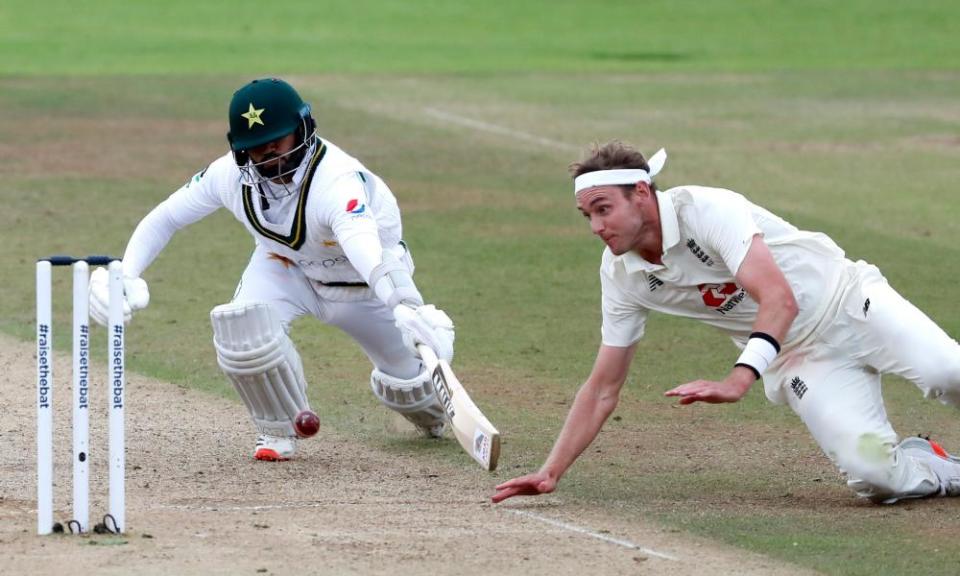Azhar Ali's heroic century fails to save Pakistan from follow-on in third Test

This may not be Pakistan’s match but it was certainly their captain’s day. Azhar Ali, a wonderfully dignified presence throughout the tour, oversaw a spirited fightback while posting his 17th Test century.
After 10 minutes’ play Pakistan had sunk to 30 for four and humiliation was on the horizon but Azhar refused to be cowed; he had battled in the gloaming on Saturday evening when the ball was darting all over the place and it was still deviating in the morning. He remained calmly resolute; he kept his front leg out of danger, his bat in the right place, and he was prepared to bide his time in the knowledge that the sun was supposed to come out, the ball would soften and run-scoring would become easier.
He finished with an unbeaten 141 out of Pakistan’s surprising total of 273. And he will start batting again on Monday morning, weather permitting.
Related: Pakistan 273 all out at stumps: third Test, day three – as it happened
This was an innings of great character as well as skill. When things are going awry Pakistan cricket captains are treated rather less sympathetically than struggling cabinet ministers at Westminster – or wherever they may be. After defeat in the first Test Azhar was apparently castigated back at home; moreover his form was dodgy; he was, the pundits kept pointing out, a walking lbw candidate.
That no longer seemed to be the case when he cover drove against Dom Bess to reach three figures, which produced a noisy ovation by the standards of 2020 – Pakistan’s white-ball squad had apparently stopped their practisce so that they could be around to applaud the landmark.
Initially it seemed unlikely that anyone would stay long enough with Azhar for him to reach three figures. Jimmy Anderson soon removed Asad Shafiq, who pushed tentatively before being neatly caught by Joe Root at slip. Out came Fawad Alam, who recorded his first Test run in 11 years when he nudged the ball on the off-side before calling his captain for a quick single.
Fawad may have an eccentric stance but he ends up in a reasonably good position when the ball is released and he battled hard alongside his captain. Jofra Archer exceeded 90mph on a regular basis but Fawad was up for the challenge before he fell victim to Bess, who was delighted to rejoin the fray as a bowler.
Bess must have enjoyed the manner of Fawad’s dismissal as well since it was a classic one for an off-spinner to a left-hander. The ball dipped a little in the air, spun away and took the edge high on the bat. To general relief Jos Buttler took a fine catch at almost chest height.
The problem for Bess thereafter was that there were no more left-handers to bowl at until the arrival of Shaheen Afridi. In the modern era the spinner who turns the ball away from the batsman is usually a more dangerous proposition, though we have not had the opportunity to test that thesis this summer.

Now Mohammad Rizwan proved a gutsy ally for Azhar and he was on hand when his captain passed 6,000 runs in Test cricket. Gradually they came more easily. Rizwan was combative against Archer who was often asked to take on the enforcer’s role, which does not entirely suit him. He cut, drove and upper-cut boundaries as the partnership passed three figures and he reached his own half-century with elan, jumping down the pitch against Bess to hit a six over long-off.
All the while Azhar was playing with increasing fluency, missing nothing off his hip and using a variety of cuts to exploit the vacant third-man boundary. They had added 138 when Buttler took another fine catch diving down the leg side to take a Rizwan glance off Chris Woakes – it may be that a seven-hour century relaxes the body and mind provided the keeper involved is a very fit man.
Now the advent of the new ball was only four overs away and the senior citizens in the England camp were very keen to get their hands on it. Anderson was only three wickets from the 600 landmark, Broad a mere 89, which soon became 87. Yasir Shah had flickered nobly for 20 but a lifting delivery took the shoulder of his bat before being very well held above head height by Root at first slip.
Then came further confirmation that Buttler is in the zone. A rare Broad bouncer to Afridi was gloved down the leg side and Buttler dived to his right to complete a spectacular catch.
Just as we were marvelling at the standard of England’s outcricket three catches were spilled off Anderson in swift succession. Azhar was dropped by Rory Burns at second slip and the ball sped away for four; next Mohammad Abbas edged to Zak Crawley at fourth slip with less venom. Then more comically – for everyone except Anderson – Broad dropped a simple chance at mid-on from Azhar but in the ensuing confusion Abbas was run-out by a direct hit from the culprit who looked as if he had been hurling the ball anywhere in disgust. Eventually Dom Sibley wrapped his hands around an edge from Naseem Shah; the innings was over; Anderson had his 29th five-wicket haul. And he almost smiled.
The follow-on was enforced by Root. Azhar, with his eye in, promoted himself to open the batting, whereupon bad light prevented any further play.

 Yahoo Sport
Yahoo Sport 





































